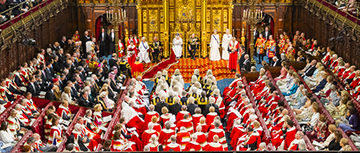On 2 May 2023, the House of Commons will decide whether to approve the House of Lords’ final amendments to the Higher Education (Freedom of Speech) Bill; if they give it the thumbs-up, the monarch will rubber-stamp his supposed assent, and the bill will become law: supreme authority throughout the land, and subject only to Henry VIII powers plus whatever the judiciary feels like doing and thinks it can get away with.
It seems that its main point of contention in Parliament is whether (per the HoC’s draft of the bill) a student will be able to civilly sue their institution (or student union); the Lords don’t like that, the Commons do. Their Lordships have modified their opposition to desire only that a civil suit cannot be commenced if the student in question has neglected to make use of a more ordinary ombudsman process. I don’t get the impression that the HoL is going to die on even that hill, so likely students will be able to sue. Either way, it looks like the bill is going to go through.
Summary of the bill: the important bits
(The following summary of the bill quotes heavily from it, but I have omitted quotation marks for the sake of avoiding clutter.)
The bill orders institutions of higher education to take all reasonably practicable steps necessary to secure freedom of speech within the law for its students, employees, and visiting speakers. It has some rules describing some of those steps.
The bill mandates that institutions of higher education not restrict the use of their premises to anyone on the basis of that anyone’s identity, ideas, beliefs, or views. (This also applies to corporate bodies, like the Lib Dems, and the views etc of their members.)
The bill also mandates that academic staff have the right to, within the law, question and test received wisdom and to put forward new ideas and controversial or unpopular opinions without risking a tangible detriment to their job.
Most of these regulations on unis apply also to SUs. SUs can’t deny clubs membership on the basis of their members’ opinions. The bill doesn’t say that SUs can’t deny clubs membership on the basis of their members’ speech regarding those opinions, but what do you expect from the Sunak Government?
If you are one of those unfortunate individuals who are terminally online and keen observers of the culture wars, you can no doubt imagine why our representatives have taken the time to add in an entire line to protect “visiting speakers”. Interestingly, the bill also requires that hosting universities foot the bill for the visiting speakers’ security; in addition to the obvious upshot of this provision, it will hopefully also preclude universities saying, “Oh, we’d love for you to speak. Nothing against you. But our students, see…well, that’s an awful nice skeletal structure you’ve got there…sure would be a shame if something…happened…to it.” However, the bill does not seem to prohibit students from shouting over controversial visiting speakers; while of course a “free speech” bill prohibiting protesting against a visitor would be completely oxymoronic, I don’t see anything about, eg, blocking attendees from entering the lecture hall or playing loud music to drown out the visitor. The bill does say that the university must regulate the conduct of anyone connected with a visiting speaker’s speech, so maybe the hope is that universities will ban students from doing anything too disruptive or censorious during visiting speakers’ events. Certainly, it bans a university from telling the Cambridge Union they can’t ring up a Nazi and ask him to talk about his politics.
And, of course, if anyone suffers due to a breach of this law, then they get to sue.
Summary of the bill: the less important bits
(Institutions of higher education are also required to write out a statement of values regarding freedom of speech (thank God we’ve finally reached an era where the mandatory buzzword collections of corporate mission statements can be conjured by ChatGPT, saving actual humans from tarnishing their souls by doing it), publish their regulations on staff/student/SU meetings, publish their criteria used to decide whether (and with what conditions) to allow people to use the premises (presumably this applies only to use of premises for speech, but the bill doesn’t actually say that). There are also some random other details, like that a university’s free speech code must be published once a year, and the school board must talk about how great freedom of speech is, and that the Office for Students must monitor this sort of thing, and so forth. The bill also establishes an ombudsman scheme wherein if a student, staff member, past or future visiting speaker, or applying member of academic staff, has suffered adverse consequences as a result of the uni’s action or inaction, they can complain to the Office for Students, who must make a nonbinding recommendation on the subject. I’m leaving out a lot of fine print, so if you see a potential loophole first check the full text of the bill and then complain to your MP.)
Did they quite think this through?
I’m a bit worried about A1(9), which to my uneducated eyes appears to say either that professors must be hired without regard to what they have actually taught regarding their matter of supposed expertise, or merely that hiring processes can’t discriminate on the basis of whether or not somebody spoke about anything; the former would be crazy, the latter useless. Hopefully, I’m just misreading the section, but probably it’s the former. In that event – that is, if Parliament accidentally bans universities from hiring professors on the basis of teaching and publications – it won’t be too disastrous. First, the universities could simply say that they’re hiring on the applicant’s ability to teach standard dogma, ignoring what other opinions the applicant may express in class or in publications; this would be splendid. Second, the courts could say that Parliament didn’t intend to accidentally make Flat Earthers eligible for professorships in astrophysics, and thus override the literal meaning of the text while still preserving the employability of expert historians who think we should hunt peasants for sport; this would be fine. (Of course, I have no problem with Flat Earthers being hired as professors of astrophysics, provided that they don’t spend too much class time arguing in favour of flat earth theory.)
Similarly, I don’t know how SUs are supposed to select visiting speakers. Fame, maybe? Though the kinds of people who tend to get invited to speak at SU events are usually famous precisely because of what things they have spent their career saying. Regardless, the burden is on the SU to come up with a code of practice, and then the wronged speakers and/or the Office for Students have the right to shoot the code down if it violates the bill.
Also, it looks like the section on SUs applies only to SUs in the sense of the Education Act 1994, which is to say that it doesn’t apply to any ordinary clubs and societies. However, the section on university governors does seem to apply to all students and staff, and all colleges and halls within a university, meaning that the physical area where clubs meet cannot be denied speakers on the grounds of the speakers’ opinions, provided that said physical area is under university or college control. (Don’t worry, employees of the Coca-Cola company won’t have an enshrined legal right to give advertising speeches in the Senate House, because the privilege to speak in that building on any subject is extremely restricted regardless of content; same with, eg, giving speeches in the Trinity College dining hall.)
How much did they actually want to pass this bill?
That this bill got passed is actually fantastic. Note how the bills’ sponsors are all members of the Conservative Party.
Tory: “Just goes to show that the Conservative Party protects the fundamental rights of man, as usual!”
Libbie: “The Conservatives have realised that universities are crawling with flaming libbies they can’t control, so in a panicked attempt to clutch on to what they still retain of their fast-waning power in institutes of higher education, they’ve agreed out of sheer desperation to pass a freedom bill because they can’t be in favour of authoritarianism when they’re not the authority. They’re terrified of the next election, and they know they can’t get away with blatantly clamping down on the left-wing element in universities, so they’ve decided to suddenly support tolerance now that they’re worried about not being tolerated.”
Tory: “…Or they’re ten times less Machiavellian than you think they are, and they’ve just seen a bunch of speech they like being muscled off university podiums.”
Libbie: “Well, if you want to assume the worst of them.”
If you’re a Lib Dem, this bill is fantastic news: the Tories have found themselves mandating the fundamentally liberal value of the marketplace of ideas. The Leopards Eating People’s Faces Party have noticed that the leopards are starting to give them a hungry side-eye, and have responded by hastily banning leopards from eating people’s faces. F–king victory, thankyouverymuch.
But wait, doesn’t this leave our side with less power?
One of the unfortunate aspects of allowing citizens freedom is that it usually means they have the freedom to do some things you don’t like. If university administrations aren’t allowed to ban speeches they don’t like, then there may come a day when both they and we want to ban a speech, but can’t. This will mean that a liberty will be granted to bad people.
People who don’t like freedom of speech generally say that we can’t possibly allow neo-Nazis to yell about how terrible various races (plus gays) are. I think that’s a bad example because it’s pretty rare for a British resident to see a Nazi parade and think “Man, they’re onto something!” That’s what counterprotests are for. Better examples, I think, are speakers who command a high percentage of the vote, such as people who believe that feminism requires more sex segregation, people who think that we shouldn’t prosecute slavery as long as the only victims are illegal immigrants, people who think that minors really ought to get longer prison sentences, people who think that hijab bans will help women by saying they aren’t allowed to work outside the home if they don’t expose themselves, people who say that Putin is really just trying to help the Ukraine, and people who think that the problem with the twenty-first century is that it has so few government positions appointed via inheritance. Now those guys are scary. But guess what! Allowing people to advocate political change is a prerequisite for democracy! SURPRISE! Democracy requires that citizens be able to vote to change laws, which in turn requires that citizens be able to consider the pros and cons of laws, which in turn requires that citizens be permitted to read and communicate the pros and cons of laws, which in turn requires that we allow citizens to say that a law is bad or that a law should be passed. Any inhibition in the citizenry’s ability to discourse freely is an inhibition to democracy.
Also, if you can’t allow people to hear arguments against your beliefs because then they’ll decide that your beliefs are wrong, that is not a good sign regarding the accuracy of your beliefs.
Even regardless of entirely political speech, another plus is that the bill will protect students’ abilities to hear whatever viewpoints they want to consider. Almost as though congregating to learn from a multitude of other perspectives is, like, the point of a university, or something.
(Also, there’s a decent chance that the university administration would otherwise try to put the screws on some of your speech because I know that you disagree with the university administration on a lot. But don’t worry – even if the bill fails, such administrative censorship will happen to you only if you’re a radical political activist; just be a nice, boring, obedient citizen, and the bill will not advantage you.)
The main danger, as I see it, is that some party will repeal the bill if they feel that they have enough sway with university administrations. (Whillikers, it’s almost as though Parliamentary sovereignty is bad, as though it’s unwise to give absolute power to an organisation with 44% of the popular vote.) In other words, the main downside of this bill is that it might get overturned. So, if ever your MP is considering abolishing it, make sure to call them and say no.
Conclusion
Parliament’s passing a bill which severely restricts university administrations from inhibiting discourse. This is good.
This post was initially intended for the Easter 2023 “Head to Head” blog competition and has been written under a pseudonym.



0 Comments